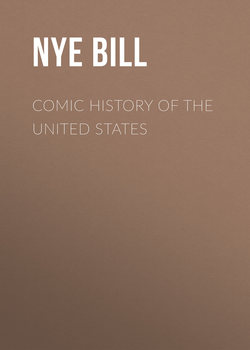Читать книгу Comic History of the United States - Nye Bill - Страница 10
CHAPTER IX.
SETTLEMENT OF THE MIDDLE STATES
ОглавлениеBERKELEY IN NEW JERSEY.
The present State of New Jersey was a part of New Netherland, and the Dutch had a trading-post at Bergen as early as 1618. After New Netherland passed into the hands of the Dutch, the Duke of York gave the land lying between the Hudson and the Delaware to Lord Berkeley and Sir George Carteret for Christmas.
The first permanent English settlement made in the State was at Elizabethtown, named so in honor of Sir George's first wife.
Berkeley sold his part to some English Quakers. This part was called West Jersey. He claimed that it was too far from town. It was very hard for a lord to clear up land, and Berkeley missed his evenings at the Savage Club, and his nose yearned for a good whiff of real old Rotten Row fog.
So many disputes arose regarding the title to Jersey that the whole thing finally reverted to the crown in 1702. When there was any trouble over titles in those days it was always settled by letting it revert to the crown. It has been some years now, however, since that has happened in this country.
Thirty-six years later New Jersey was set apart as a separate royal province, and became a railroad terminus and bathing-place.
Delaware was settled by the Swedes at Wilmington first, and called New Sweden. I am surprised that the Norsemen, who it is claimed made the first and least expensive summer at Newport, R. I., should not have clung to it.
They could have made a good investment, and in a few years would have been strong enough to wipe out the Brooklyn police.
CHEAPEST NEWPORT SEASON.
The Swedes, too, had a good foothold in New York, Jersey, and Delaware, also a start in Pennsylvania. But the two nations seemed to yearn for home, and as soon as boats began to run regularly to Stockholm and Christiania, they returned. In later years they discovered Minneapolis and Stillwater.
William Penn now loomed up on the horizon. He was an English Quaker who had been expelled from Oxford and jugged in Cork also for his religious belief. He was the son of Admiral Sir William Penn, and had a good record. He believed that elocutionary prayer was unnecessary, and that the acoustics of heaven were such that the vilest sinner with no voice-culture could be heard in the remotest portion of the gallery.
The only thing that has been said against Penn with any sort of semblance of truth was that he had some influence with James II. The Duke of York also stood in with Penn, and used to go about in England bailing William out whenever he was jailed on account of his religious belief.
Penn was quite a writer (see Appendix). He was the author of "No Cross, No Crown," "Innocency with her Open Face," and "The Great Cause of Liberty of Conscience."
From his father he had inherited a claim against the government for sixteen thousand pounds, probably arrears of pension. He finally received the State of Pennsylvania as payment of the claim. The western boundary took in the Cliff House and Seal Rocks of San Francisco.
Penn came to America in 1682 and bought his land over again from the Indians. It is not strange that he got the best terms he could out of the Indians, but still it is claimed that they were satisfied, therefore he did not cheat them.
The Indian, as will be noticed by reading these pages thoughtfully, was never a Napoleon of finance. He is that way down to the present day. If you watch him carefully and notice his ways, you can dicker with him to better advantage than you can with Russell Sage.
Take the Indian just before breakfast after two or three nights of debauchery, and offer him a jug of absinthe with a horned toad in it for his pony and saddle, and you will get them. Even in his more sober and thoughtful moments you can swap a suit of red medicated flannels with him for a farm.
Penn gathered about him many different kinds of people, with various sorts and shades of belief. Some were Free-Will and some were Hard-Shell, some were High-Church and reminded one of a Masonic Lodge working at 32°, while others were Low-Church and omitted crossing themselves frequently while putting down a new carpet in the chancel.
A FEW OF PENN'S PEOPLE.
But he was too well known at court, and suspected of knowledge of and participation in some of the questionable acts of King James, so that after the latter's dethronement, and an intimation that Penn had communicated with the exiled monarch, Penn was deprived of his title to Pennsylvania, for which he had twice paid.
